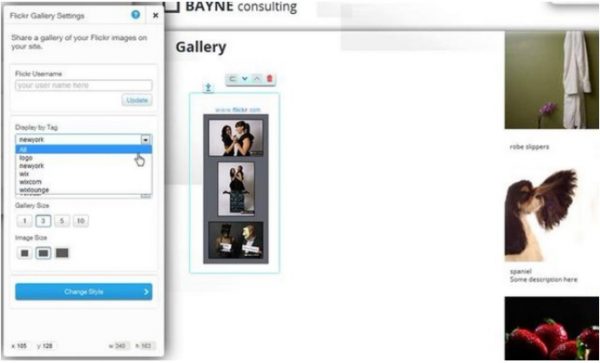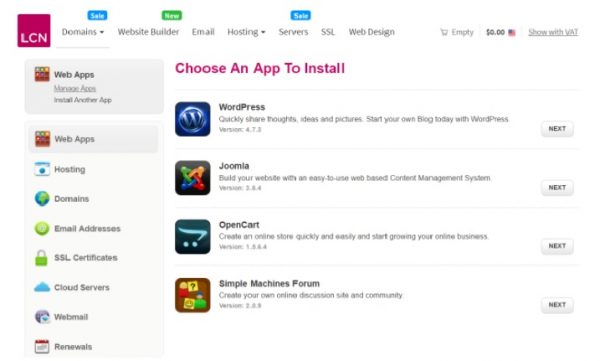
In addition to the many things you should consider when choosing a web hosting service, there is the website builder selection factor – one that is the least discussed, and is actually of high importance to those who wish to build a website while saving up on developer costs.
Many website hosting companies offer varying website builders as part of their web hosting packages. These are indeed convenient add-ons, allowing anyone to easily create their websites as they pay for web hosting.
For this discussion, though, we will be excluding the advanced website builders offered by the likes of Wix, Weebly, SiteBuilder, and Squarespace. The focus here is on those offered by companies that are known to be mainly web hosting service providers, not those that are more known for their on-the-fly web-based website building platforms.

Wix’s website builder
What Do Most Website Builders Offer?
The website builders of most web hosting companies provide the following:
- Templates
- WYSIWYG or Drag-and-drop interface
- Search engine optimized design
- Mobile-ready design
These are similar to what you can find in free blogging platforms like Blogger and WordPress. By the way, it makes sense using Blogger and WordPress as reference since they are two of the most widely used content publication platform online and they embody many of the facets of the website builders being offered by web hosts at present. They help users get acquainted with the basic elements of a site such as the header, the sidebars, the footer, main body, ads, and special elements that involve the insertion of certain scripts or codes.
Website builders typically come with templates to make it even easier for anyone to come up with their websites. These templates present pre-made designs or layouts so users can immediately proceed to adding content or doing tweaks to make the design more suitable for their preferences. Web hosts usually tout these templates as “stunning” or “professionally designed”—something debatable although they’re really not bad.
The WYSIWYG or drag-and-drop interface is the core feature that makes website builders easy to use. It is one of the most important advantages of website builders. With this, users don’t have to learn any coding. Page elements can easily be added to the site by simply dragging certain types of elements into a desired position on the web page. It’s very easy to come up with a decent web design without any HTML or programming knowledge.
Moreover, most website builders already take mobile-friendliness and search engine optimization (SEO) into account. They are designed to create sites that can automatically adapt to the display size of the device used to access them. They also incorporate SEO techniques or strategies like the need to create a sitemap, the insertion of keywords into specific parts of the site, and the use of design principles that make it easy for search engines to index pages. These are very important since implementing SEO strategies on an unoptimized site may mean having to basically start from scratch. The same goes with creating a responsive web design or a mobile-friendly design.
Design Advantages of Website Builders
As mentioned, website builders help anyone create a website without any coding knowhow. By just following simple steps and getting acquainted with a basic interface, anyone can come up with a decent or even great-looking site. Website builders allow anyone to churn out sites without having to install new software and without having to worry about accessing FTP servers. Since these website builders are seamlessly integrated with the control panels of the web hosts, the sites created through them go online automatically.
Through readily available templates, website builders also make it easier to start creating a website. There’s usually a wide array of designs and color schemes to choose from. In some cases, these templates can be customized. There are website builders that allow the modification of colors and the sizes of the page elements. They may not provide extensive design freedom but they allow anyone to near-instantly come up with something that can pass for good design.

Website builder choices in LCN’s web hosting interface.
Moreover, most of the website builders of web hosting companies are usually free. In case you are confused—yes, there are website builders that entail recurrent payments like Wix and Weebly. As mentioned in the introductory paragraph of this post, though, these advanced website builders are excluded from the discussion here as they tend to rival professional website designs but at a cost. The focus here is on the mostly free website builders offered as auxiliary services by web hosting companies.
Design Disadvantages of Website Builders
There are two significant disadvantages in using website builders: customization limitations and the ownership of the design.
Website builders rarely afford a good amount of customization. While you may be able to change colors and adjust font sizes, resizing page elements may not be allowed. If it’s possible, you may have to learn how to work with HTML codes and CSS.
Another important disadvantage if website builders is the problem of design ownership. Most web hosts that offer website builders indicate in their terms and conditions that the designs are solely theirs and cannot be transferred to users regardless of the customizations implemented. Hence, if you plan to switch to a new web host, you can’t take the design to the new web host.
How Good Are Website Builders Design-Wise?
Arguably, most website builders are capable of producing good enough web designs. They can create visually appealing or at least decent-looking sites that can be used by small businesses, nonprofit organizations, artists, or photographers. It’s a big plus if the resulting designs are mobile-friendly and SEO ready. Gone are the days of sites that look like what Geocities and Typepad are able to produce, fortunately. However, it’s important to note that your website may not have a unique look as others may use the same template you are using.
In summary, website builders are a cost-free way to quickly put up a decent-looking website. They offer a good deal of advantages. They certainly don’t come close to the quality, aesthetics, and function possible with professional web development services. However, if you are just after a decent looking website with basic functionalities, website builders can be good enough provided that they incorporate SEO techniques and mobile-friendliness. Interested to know more about website builders beyond the design context? Consider going over this helpful review by a website developer who tried 10 of the most popular website builders at present.
Originally posted on October 29, 2017 @ 10:31 am